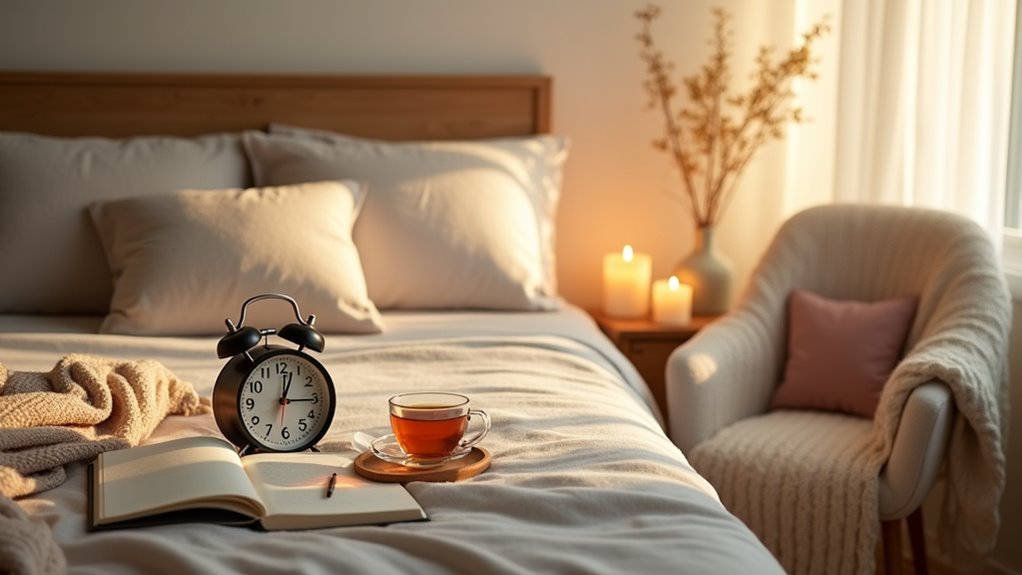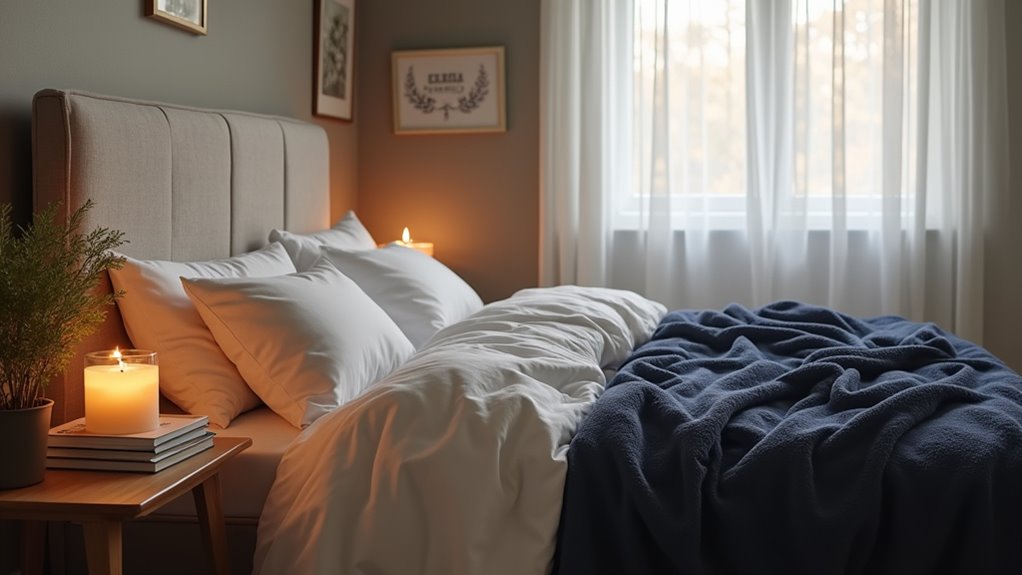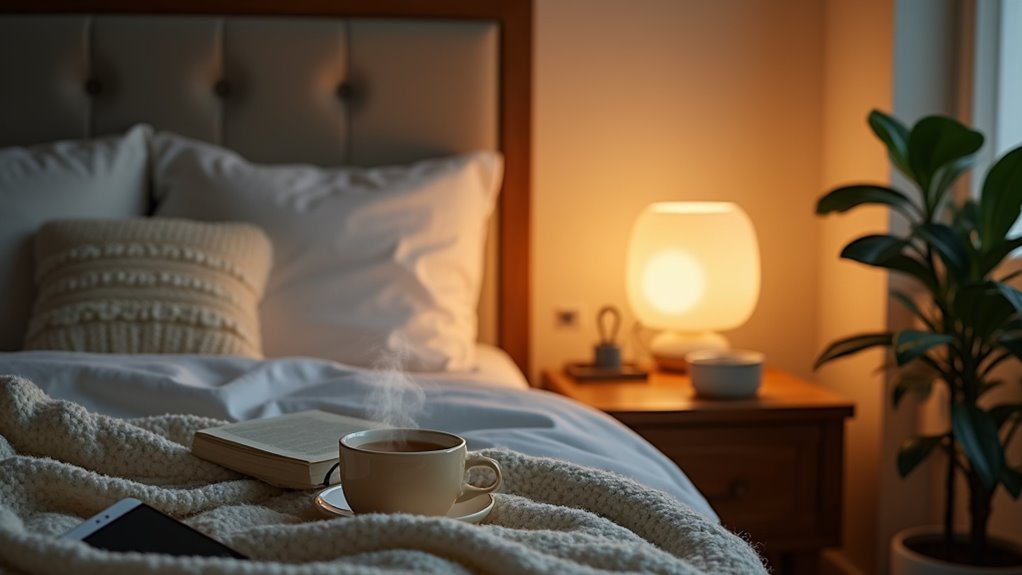As you wind down your day, consider how your nighttime habits impact your sleep and overall wellness. Simple rituals can create a calming routine that enhances the quality of your rest. From creating a serene environment to practicing relaxation techniques, there’s a lot you can do to improve your sleep. Let’s explore these effective strategies and discover how they can transform your nights into rejuvenating experiences.
The Importance of Sleep for Overall Wellness

While you might underestimate sleep’s role in your life, it’s crucial for your overall wellness. Quality sleep impacts your physical health, mental clarity, and emotional balance.
When you don’t get enough rest, you may notice increased stress levels and a weakened immune system. Your body needs time to repair and rejuvenate, and that happens during sleep.
A consistent sleep schedule helps regulate your body’s internal clock, leading to better mood and productivity. Prioritizing sleep can also improve your memory and concentration, making it easier to tackle daily challenges.
Instead of viewing sleep as an afterthought, recognize its importance in maintaining your health. Embrace restful nights, and watch how your overall wellness flourishes.
Understanding Sleep Cycles and Their Impact

Understanding sleep cycles is essential, as they significantly influence your overall rest quality. Each night, your body goes through several cycles, typically lasting about 90 minutes each.
These cycles consist of various stages, including light sleep, deep sleep, and REM sleep. During light sleep, you may drift in and out of consciousness, while deep sleep is crucial for physical restoration and recovery. REM sleep, on the other hand, supports cognitive functions and emotional well-being.
If you disrupt these cycles—by staying up late or waking up too early—you might feel groggy and unfocused the next day. By aligning your sleep schedule with these natural cycles, you can enhance your energy levels, mood, and overall health.
Prioritizing this understanding can lead to better wellness outcomes.
Creating a Calming Sleep Environment

To foster a restful night’s sleep, creating a calming sleep environment is crucial. Start by keeping your bedroom dark, quiet, and cool. Use blackout curtains to block out light and consider a white noise machine or earplugs to reduce unwanted sounds.
Invest in comfortable bedding that makes you feel cozy and secure. Aromatherapy can also enhance your space; try using essential oils like lavender for relaxation.
Decluttering your room helps create a sense of peace, so keep surfaces tidy and organized. Lastly, limit screen time before bed; the blue light from devices can disrupt your sleep cycle.
The Role of Nutrition in Sleep Quality

Nutrition plays a vital role in your sleep quality, influencing how well you rest each night. What you eat can either promote restful sleep or disrupt it.
Consuming foods rich in magnesium, like leafy greens and nuts, can help relax your muscles and nerves, aiding sleep. On the other hand, high sugar and heavy meals close to bedtime can lead to restless nights.
It’s also important to pay attention to caffeine and alcohol intake—both can interfere with your sleep cycles. Incorporating foods high in tryptophan, such as turkey and bananas, can boost serotonin levels, promoting better sleep.
Effective Relaxation Techniques to Try

As you wind down for the night, incorporating effective relaxation techniques can significantly enhance your ability to fall asleep.
Start with deep breathing exercises; inhale slowly through your nose, hold for a few seconds, then exhale gently through your mouth.
You might also try progressive muscle relaxation, where you tense and then relax each muscle group, starting from your toes and working up to your head.
Aromatherapy can be beneficial, too—consider using lavender essential oil to create a calming atmosphere.
Another great option is gentle yoga or stretching, which helps release tension.
Finally, keep a journal by your bedside to jot down any lingering thoughts, allowing your mind to let go of the day’s stresses.
The Benefits of Limiting Screen Time Before Bed

Incorporating relaxation techniques into your nighttime routine is only part of the equation for a good night’s sleep.
Limiting screen time before bed is equally crucial. When you cut back on electronic devices, you reduce exposure to blue light, which can interfere with melatonin production and disrupt your sleep cycle.
Without the constant barrage of notifications or scrolling, you’ll find it easier to unwind and disconnect from the stress of the day. This break allows your mind to relax, making it simpler to fall asleep.
You’ll likely notice improvements in sleep quality and duration. Plus, without screens, you can engage in more calming activities like reading or meditating, enhancing your overall bedtime experience.
Prioritize your sleep by going screen-free.
Incorporating Light Exercise Into Your Evening Routine

While winding down for the night, adding light exercise to your evening routine can significantly enhance your sleep quality.
Gentle activities like stretching, yoga, or a leisurely walk can help relax your body and mind. These exercises promote blood flow, release tension, and reduce stress, making it easier to transition into sleep.
Aim for about 20-30 minutes of light movement, ideally an hour or two before bed. You don’t need to push yourself hard; the goal is to unwind.
Listen to your body, and choose exercises that feel good for you. By incorporating this simple habit, you’ll create a calming atmosphere that prepares you for restorative sleep, allowing you to wake up refreshed and energized.
The Power of Journaling for Better Sleep

If you’re struggling to drift off at night, journaling can be a powerful tool to help quiet your mind. By putting your thoughts on paper, you’re creating a space between your worries and your rest.
Take a few minutes to jot down what’s on your mind—whether it’s tasks for tomorrow, feelings from the day, or even things you’re grateful for. This practice can help release pent-up emotions and clarify your thoughts, making it easier to relax.
Consider writing in a dedicated sleep journal, focusing solely on your nighttime reflections. You might find that capturing your thoughts reduces anxiety, allowing you to unwind and eventually fall asleep more peacefully.
Give it a try and watch how it transforms your nighttime routine.
Establishing a Consistent Sleep Schedule

Establishing a consistent sleep schedule is crucial for improving your overall sleep quality and well-being. Going to bed and waking up at the same time each day trains your body’s internal clock, making it easier to fall asleep and wake up refreshed.
Aim for seven to nine hours of sleep nightly, adjusting your bedtime if necessary.
Try creating a relaxing pre-sleep routine, like dimming lights or reading, to signal your body that it’s time to wind down. Avoid screens and caffeine close to bedtime, as they can disrupt your sleep.
Conclusion
By prioritizing these nighttime rituals, you’re setting yourself up for better sleep and overall wellness. Embrace techniques like deep breathing, gentle yoga, and journaling to enhance your nighttime routine. Create a serene environment and be mindful of your nutrition and screen time. Remember, consistency is key—establish a regular sleep schedule to truly reap the benefits. With these simple practices, you can enjoy restorative rest, improved mental clarity, and enhanced emotional balance in your life.


